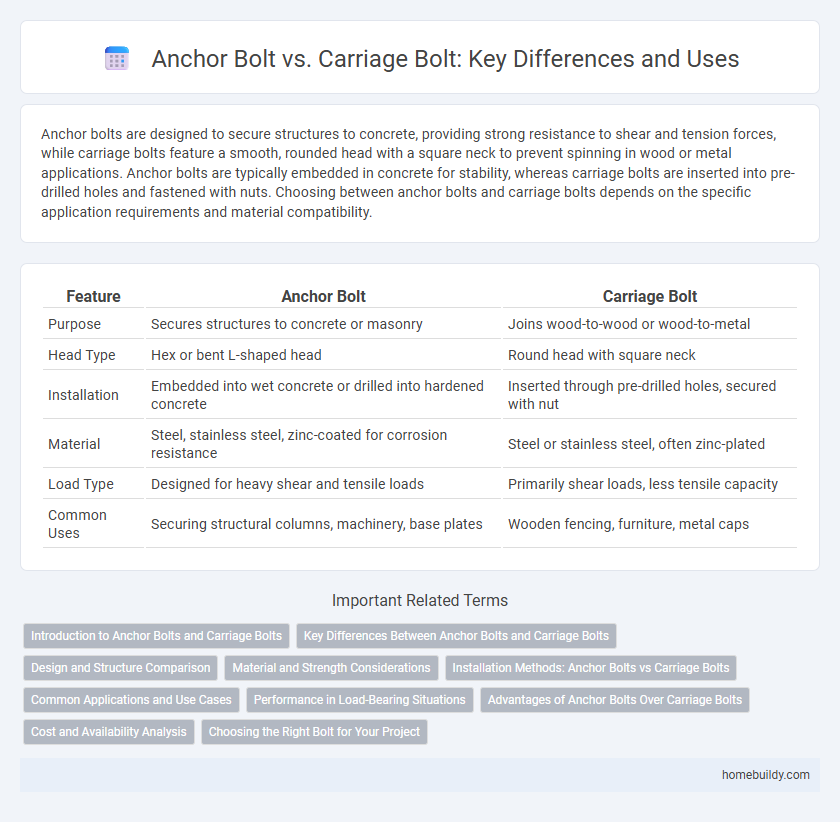Anchor bolts are designed to secure structures to concrete, providing strong resistance to shear and tension forces, while carriage bolts feature a smooth, rounded head with a square neck to prevent spinning in wood or metal applications. Anchor bolts are typically embedded in concrete for stability, whereas carriage bolts are inserted into pre-drilled holes and fastened with nuts. Choosing between anchor bolts and carriage bolts depends on the specific application requirements and material compatibility.
Table of Comparison
| Feature | Anchor Bolt | Carriage Bolt |
|---|---|---|
| Purpose | Secures structures to concrete or masonry | Joins wood-to-wood or wood-to-metal |
| Head Type | Hex or bent L-shaped head | Round head with square neck |
| Installation | Embedded into wet concrete or drilled into hardened concrete | Inserted through pre-drilled holes, secured with nut |
| Material | Steel, stainless steel, zinc-coated for corrosion resistance | Steel or stainless steel, often zinc-plated |
| Load Type | Designed for heavy shear and tensile loads | Primarily shear loads, less tensile capacity |
| Common Uses | Securing structural columns, machinery, base plates | Wooden fencing, furniture, metal caps |
Introduction to Anchor Bolts and Carriage Bolts
Anchor bolts are designed to secure structural elements to concrete, offering high tensile strength and resistance to shear forces, making them essential in construction for stability and safety. Carriage bolts feature a rounded, dome-shaped head with a square neck that prevents rotation, commonly used in wood applications where a smooth, finished appearance is desired. Understanding the distinct functions and design features of anchor bolts versus carriage bolts helps in selecting the right fastener for specific building requirements.
Key Differences Between Anchor Bolts and Carriage Bolts
Anchor bolts are designed primarily for securing structures to concrete, featuring a threaded end for nuts and a bent or hooked shape to resist pullout forces. Carriage bolts have a smooth, rounded head with a square neck to prevent rotation when tightened, making them ideal for fastening wood or metal in construction projects. The key difference lies in their applications and design: anchor bolts provide strong anchoring in masonry foundations, while carriage bolts ensure a flush, clean finish in wood-to-metal connections.
Design and Structure Comparison
Anchor bolts feature a bent or hooked end designed to provide strong embedment in concrete, ensuring secure anchorage under heavy loads. Carriage bolts have a smooth, rounded head with a square neck that prevents rotation during installation, primarily used in wood or metal applications without requiring embedment. The key structural difference lies in the anchor bolt's embedment-specific design versus the carriage bolt's focus on easy fastening and anti-rotation without concrete anchoring.
Material and Strength Considerations
Anchor bolts are typically made from high-strength steel or stainless steel, providing superior tensile strength and corrosion resistance compared to carriage bolts, which are often manufactured from lower-grade steel or zinc-plated materials. The design of anchor bolts allows them to withstand heavier loads and dynamic stresses in concrete or masonry installations, whereas carriage bolts are primarily used for wood and light metal connections requiring less structural support. Material composition and mechanical properties are critical factors that influence the selection between anchor bolts and carriage bolts for load-bearing and safety-critical applications.
Installation Methods: Anchor Bolts vs Carriage Bolts
Anchor bolts require precise embedding into concrete or masonry during the pouring process, ensuring a secure, load-bearing connection critical in structural applications. Carriage bolts are installed through pre-drilled holes in wood or metal, secured with nuts and washers, offering easier adjustments and removal. The installation of anchor bolts demands careful alignment and curing time, while carriage bolts provide quicker assembly with less permanent fixation.
Common Applications and Use Cases
Anchor bolts are primarily used for securing structural elements to concrete, making them essential in construction projects like mounting steel columns, securing machinery bases, and fixing heavy equipment. Carriage bolts, characterized by their rounded heads and square necks, are commonly employed in woodworking, fastening metal to wood, and outdoor applications such as decking and fencing. The choice between anchor bolts and carriage bolts depends on the material substrate and load requirements, with anchor bolts excelling in concrete anchorage and carriage bolts ideal for wood-to-metal fastening.
Performance in Load-Bearing Situations
Anchor bolts provide superior performance in load-bearing situations due to their embedded design, which offers high resistance against shear and tensile forces in structural applications. Carriage bolts, with their smooth, rounded heads and square necks, are less effective in heavy load scenarios because they mainly rely on surface clamping rather than deep anchoring. Structural engineers prefer anchor bolts for critical load-bearing tasks where stability and secure fastening are essential.
Advantages of Anchor Bolts Over Carriage Bolts
Anchor bolts offer superior load-bearing capacity and enhanced stability compared to carriage bolts due to their embedded installation in concrete foundations. Their corrosion resistance and ability to withstand heavy shear and tensile forces make them ideal for structural applications requiring long-term durability. Unlike carriage bolts, anchor bolts provide a more secure fastening for critical infrastructure such as steel columns and heavy machinery.
Cost and Availability Analysis
Anchor bolts typically cost less than carriage bolts due to simpler manufacturing processes and widespread use in construction, making them more budget-friendly for large projects. Availability of anchor bolts is generally higher in hardware stores and industrial suppliers, as they are essential for securing structures to concrete. Carriage bolts, while widely available, may have higher costs because of their unique rounded heads and square necks, which require more precise machining.
Choosing the Right Bolt for Your Project
Anchor bolts provide superior holding power in concrete and masonry applications due to their embedded design, making them ideal for structural stability. Carriage bolts, with their rounded heads and square necks, are best suited for wood and metal fastening where surface finish and ease of installation matter. Selecting the right bolt depends on load requirements, substrate material, and project environment to ensure safety and durability.
anchor bolt vs carriage bolt Infographic

 homebuildy.com
homebuildy.com